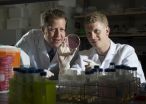New method to treat antibiotic resistant MRSA: Bacteriophages
Student targets MRSA with phages after disease costs father his leg
2015-09-14
(Press-News.org) MRSA is bad news. If you've never heard of it, here's what you need to know: It's pronounced MER-suh, it's a nasty bacterial infection and it can cause serious disease and death.
Senior molecular biology major Jacob Hatch knows MRSA as the infection that took his dad's leg.
Hatch was thousands of miles away on an LDS (Mormon) mission when Methicillin-Resistant Staphylococcus aureus decalcified the bones in his dad's foot and lower leg, leading to an emergency amputation just below the knee.
"It was really hard to hear the news--you never expect to hear someone in your family having to have a limb amputated," Hatch said. "I felt helpless being so far away."
Now Hatch is exacting revenge on the bacteria. Researching alongside assistant professor of microbiology and molecular biology (and brother-in-law) Bradford Berges, Hatch is unlocking the power of a new MRSA-killer: bacteriophage.
Phages are viruses that seek out, infect and kill bacteria. BYU researchers have successfully used them to save beehives from American foulbrood, and now they are harnessing their abilities to find MRSA and eliminate it.
In a recent study published in high-ranking journal PLOS ONE, Hatch, Berges and colleagues demonstrate the ability of phages to decontaminate (kill off) human MRSA bacteria from both hard surfaces (glass table top) and fabrics (lab coat).
The findings on phage effectiveness against MRSA are increasingly vital since the deadly bacterium is now resistant to almost all available antibiotics. Doctors worry that the one antibiotic that can still treat MRSA--vancomycin--may soon be ineffective as well.
MRSA is most problematic in hospitals and nursing homes--places where the sick and wounded are susceptible to infection. Berges said about 30 percent of humans are carriers for the bacteria, but it only "gets nasty" when it penetrates the skin.
People who are infected can develop sepsis, pneumonia, meningitis or even die. Fortunately, Berges and Hatch's research is showing that phages kill more than 99 percent of MRSA pathogens.
"And while phages kill off bacteria, they will never cause any problems to humans because it's a virus that's evolved to infect bacteria cells," Berges said. "It's never going to infect human cells--it's not even a possibility."
To date, the research team has identified six unique phage types that can kill off MRSA. Their future research will identify even more MRSA-killing phages.
Thanks to the mentoring of Berges, Hatch has now published as an undergraduate student and is in prime position for medical school next year. He hopes his work can prevent others from the challenges his dad has faced.
"This research is my way of coping with it and feeling like I've been able to do something to solve these type of problems," Hatch said. "It's been so rewarding to see that it is working."
INFORMATION:
[Attachments] See images for this press release:


ELSE PRESS RELEASES FROM THIS DATE:
2015-09-14
Irvine, Calif., Sept. 14, 2015 -- University of California, Irvine researchers with the School of Medicine have identified the mechanism by which valproic acid controls epileptic seizures, and by doing so, also revealed an underlying factor of seizures.
Valproic acid is widely used to treat various types of seizure disorders, but to this point, the cellular mechanism affected by its anticonvulsant properties were not well understood.
Dr. Naoto Hoshi, an associate professor of pharmacology and physiology & biophysics, and colleagues discovered that valproic acid preserved ...
2015-09-14
Athens, Ga. - Microbiology researchers at the University of Georgia studying a soil bacterium have identified a potential mechanism for neurodegenerative diseases.
A role for the protein HSD10 had been suspected in patients with Alzheimer's disease and Parkinson's disease, but no direct connection had previously been established. This new breakthrough suggests that HSD10 reduces oxidative stress, promotes cell repair and prevents cellular death.
The authors first discovered that an enzyme related to HSD10, CsgA, produces energy during sporulation in the bacterium ...
2015-09-14
A new review has produced the most conclusive evidence to date that people consume more food or non-alcoholic drinks when offered larger sized portions or when they use larger items of tableware. The research, carried out by the University of Cambridge and published in the Cochrane Database of Systematic Reviews, suggests that eliminating larger-sized portions from the diet completely could reduce energy intake by up to 16% among UK adults or 29% among US adults.
Overeating increases the risks of heart disease, diabetes, and many cancers, which are among the leading causes ...
2015-09-14
Single grandparents raising grandchildren are more vulnerable to poor physical and mental health than are single parents, according to a study recently published in Current Gerontology and Geriatrics Research.
These caregivers may be at greater risk for diminished physical capacity and heightened prevalence of depression, researchers found.
Researchers at Georgia State University and the University of Toronto found that solo grandparents caring for grandchildren fare worse than single parents across four critical health areas: physical health, mental health, functional ...
2015-09-14
SAN FRANCISCO--After analyzing the seismic waves produced by small underground chemical explosions at a test site in Vermont, scientists say that some features of seismic waves could be affected by the amount of gas produced in the explosion.
This unexpected finding may have implications for how scientists use these types of chemical explosions to indirectly study the seismic signal of nuclear detonations. Researchers use chemical blasts to learn more about the specific seismic signatures produced by explosions--which differ from those produced by earthquakes--to help ...
2015-09-14
A new guideline that aims to prevent fractures in residents of long-term care facilities is targeted at frail seniors and their families as well as health care workers. The guideline, published in CMAJ (Canadian Medical Association Journal), was developed with input from residents of long-term care facilities and their families, as well as researchers and health care professionals.
Seniors living in long-term care homes have a two- to four-fold risk of sustaining a fracture such as a hip or spinal fracture, compared with adults of similar age living in the community. ...
2015-09-14
Scientists have identified a gene - FOXC1 - that, if switched on, causes more aggressive cancer in a fifth of acute myeloid leukaemia (AML) patients, according to a Cancer Research UK study* published in the journal Cancer Cell, today.
The FOXC1 gene is normally switched on during embryonic development and is needed to turn cells into specialised tissues, like the eyes, kidney, brain and bone.
But this new research found that in certain patients with AML - a type of blood cancer that affects white blood cells and the bone marrow - this gene was wrongly switched on inside ...
2015-09-14
(BOSTON) - Stem cell therapies are often limited by low survival of transplanted stem cells and the lack of precise control over their differentiation into the terminal cell types needed to repair or replace injured tissues. Now, a team led by Wyss Institute Core Faculty member David Mooney, Ph.D., has developed a new strategy - embedding stem cells into porous, transplantable hydrogels - that has experimentally improved bone repair by boosting the survival rate of transplanted stem cells and influencing their cell differentiation.
Mooney - who is also the Robert P. Pinkas ...
2015-09-14
(Boston)--A panel of experts and researchers have developed a new classification system for gout, the most common form of inflammatory arthritis. This new system standardizes the classification of this condition using a variety of evidence-based criteria.
Led by a researchers at Boston University School of Medicine (BUSM) and institutions from around the world, the study is a joint publication appearing in two journals simultaneously, Annals of Rheumatologic Disease and Arthritis & Rheumatology.
Gout is characterized by the deposition of a specific type of crystal in ...
2015-09-14
GAINESVILLE, Fla. -- Larger and private colleges and universities seem to attract hookah cafes and lounges, but smoke-free policies decrease these odds, according to findings published in the American Journal of Preventive Medicine this month.
That may bode well for the long-term health of college-age students.
Waterpipe smoking, more commonly known as hookah, boasts enticing flavors and a healthier reputation, increasing its popularity among college students. It is estimated that more than 10 percent of U.S. college students are current users.
However, recent evidence ...
LAST 30 PRESS RELEASES:
[Press-News.org] New method to treat antibiotic resistant MRSA: Bacteriophages
Student targets MRSA with phages after disease costs father his leg


